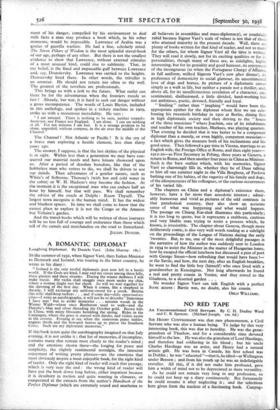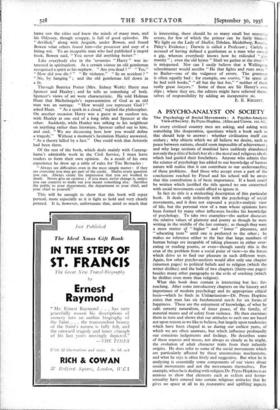NO RED TAPE
An Unconventional Civil Servant. By C. H. Dudley Ward and C. B. Spencer. (Michael Joseph. los. 6d.) SIR HENRY CUNYNGHAME was that rare phenomenon, a Civil Servant who was also a human being. To judge by this very interesting book, this was due to heredity. He was the great- grandson of Thurlow, and for a considerable time devoted himself to the law. He was also the grandson of Lord Hardinge, and therefore had soldiering in his blood ; but his uncle Charles Hardinge was an artist, and Henry had a natural artistic gift. He was born in Canada, his first school was in Dublin ; he was "educated "—that is, he idled—at Wellington under Benson ; and from his youth up ha was an indefatigable traveller. All this, if it did not make him profound, gave him a width of mind not to be depreciated as mere versatility.
As he could not remain very long in any profession, so he could not keep up a diary continuously. But fortunately he could resume it aftei neglecting it ; and the selections here given form the nucleus of a fascinating book Cunyng. hame saw the cities and knew the minds of many men, and his Odyssey, though scrappy, is full of good episodes. He " devilled," along with Asquith, under Bowen, and found Bowen what others found him—the possessor and unr of a biting wit. To an incapable man who had published a' stupid book, Bowen said, " Yon never did anything berter."
Like everybody else in the 'seventies "Harry " was in- terested in spiritualism. At a certain séance an old gentleman recognised a spirit as his nephew. " Are you dead ? " " Yes." " How did you die ? " " By violence." " In an accident ? " " No, by hanging " ; and the old gentleman fell down in a fit.
Through Beatrice Potter (Mrs. Sidney Webb) Harry met
Spencer and Huxley ; and he tells us something of both. Spencer's views of art were characteristic. He told Holman Hunt that Michelangelo's representation_ of God as an old man was an outrage. " How would you represent God ? "
asked Hunt. " As a spark in a cloud," replied the philosopher.
On another occasion Harry was a , guest at an outdoor tea, with Huxley at one end of a long table and Spencer at the other. Suddenly, while Huxley was talking to his neighbour on anything rather than literature, Spencer called out to him, and said, " We are discussing here how you would • define a tragedy." Without a moment's hesitation Huxley answered, " As a theory killed by a fact." One could wish that Aristotle had been there.
Of the rest of the book, which deals mainly with Cunyng- hame's admirable work in the Civil Service, I must leave readers to form their own opinion. As a result of his own
experience he drew up a table of rules for Tite Barnacles :
" Always see difficulties even in the most simple matter : if they are overcome you may get part of the credit. Shelve every question you can. Always create the impression that you are worked to death. Never give an opinion ; if you must, never change it, unless you can contrive to make out you meant something else. Sacrifice the public to your department, the department to your chief, and your chief to yourself."
This will be enough to show that this book will repay perusal, more especially as it is light to hold and very clearly printed. It is, however, unfortunate that, amid so much that
is interesting, there should be so many small but annoying errors, for few of which the printer can be fairly blamed. We. light on the Lady of Shallot, Dibden, Ifeidelbarg, Rosati, Paley's Evidence ; Darwin is called a Professor ; Carlyle is accused of having defined a gentleman as a man who owned a gig, whereas everybody knows how he ridiculed - " gig- manity " ; even the old hymn " Shall we gather at the river ? " is misquoted. Nor can I easily believe that a Wellington schoolmaster would ascribe " He that fights and runs away" to Butler—one of the vulgarest of errors. The grammar is often equally bad : for example, une sourire," he spent all he had with books," " all but the last has," "neither of them really great lawyers." Some of these are Sir Henry's own slips ; where they are, the editors might have relieved them- selves of responsibility by adding an inexpensive sic.
E. E. KELLErr.















































 Previous page
Previous page